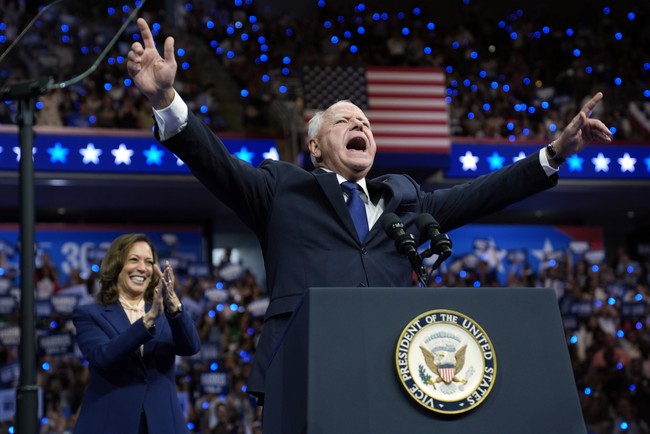Poor Tim Walz.
The governor of Minnesota, in one of his first major interviews since losing the vice presidency, admitted he was “a little surprised” by the Democrats’ defeat. Reflecting on the loss, Walz seemed to suggest he had pinpointed the culprit. And who’s to blame, in his view? America itself. According to Walz, voters simply chose the “wrong kind of leadership.” Thanks a lot, America.
For any historians planning to write the definitive account of why the Kamala Harris-Tim Walz ticket failed, Walz’s post-election interviews are a must-see. In his conversations with local Minneapolis-St. Paul stations WCCO-TV and KSTP-TV, the governor expressed surprise at the outcome, insisting the campaign had been brimming with optimism.
“It felt like at the rallies, at the things I was going to, the shops I was going in, that the momentum was going our way,” Walz said. “And it obviously wasn’t at the end … So yeah, I was a little surprised. I thought we had a positive message, and I thought the country was ready for that.”
When asked who or what was responsible for the loss, Walz pointedly excluded himself. “I did the best I could,” he told KSTP.
Sure, America. What more could Walz have done? After all, he even owned up to being a “knucklehead” for some of his past missteps, including lies about Tiananmen Square. What more do you want from the man?
Apparently, you wanted more negativity. According to Walz, the Democrats’ focus on positivity may have backfired. “I think what we have to understand is the mood where people are at and understanding where they’re at,” he said in his WCCO interview. “I think economic issues did impact them. I think we’re going to have to understand — what type of leadership do they want?
“We were pledging to be inclusive. We were pledging to bring people in. Donald Trump has said that that isn’t what he wants, and so if that’s what America is leaning towards, I guess for me, it’s to understand and learn more about America, because I thought that they were going to probably move towards a more positive message.”
Don’t mistake his tone for anger, though. Walz insists he’s not mad, just “bitter” and disappointed.
But Walz’s surprise doesn’t align with accounts from inside the campaign. According to The New York Times, senior Harris-Walz campaign leaders were far less optimistic in the lead-up to Election Day. During an appearance on Pod Save America, campaign chair Jen O’Malley Dillon and senior adviser David Plouffe admitted they had little faith Harris would win.
So, did Walz really believe the campaign’s own hype, or was he in denial? Given his track record, the latter seems more plausible.
Walz’s claim of running a “positive” campaign is also questionable. The Harris-Walz ticket routinely compared Donald Trump to Hitler and warned voters of an impending dystopia under his leadership. Hardly the hallmark of a Dale Carnegie-inspired campaign.
Meanwhile, Americans faced skyrocketing inflation, ballooning federal debt, and escalating foreign conflicts under Joe Biden’s administration. For Walz to claim bewilderment over why voters sought different leadership feels profoundly out of touch.
Even at home in Minnesota, Walz’s star is dimming. Democrats lost total control of the state government, curtailing his ability to push through the progressive agenda that had elevated his national profile. Walz admitted to spending the weeks after the election reaching out to Republican legislators to prepare for the next session.
Still, Walz remains defiant in his message. “To have Donald Trump seen as a champion of the middle class, I fully don’t see how that would happen,” he said. “But I recognize that’s where people voted. I think we have to both decide, is the message the right one?”
The voters already made that decision, Tim. And while Harris staffers continue to lament the outcome, perhaps they should consider Pennsylvania Governor Josh Shapiro. Ready and capable, Shapiro might have been a stronger running mate—if only he hadn’t been too ambitious or, heaven forbid, too pro-Israel for the left. Just saying.
 Telegram is where we really talk. Don't miss out!
Telegram is where we really talk. Don't miss out!






